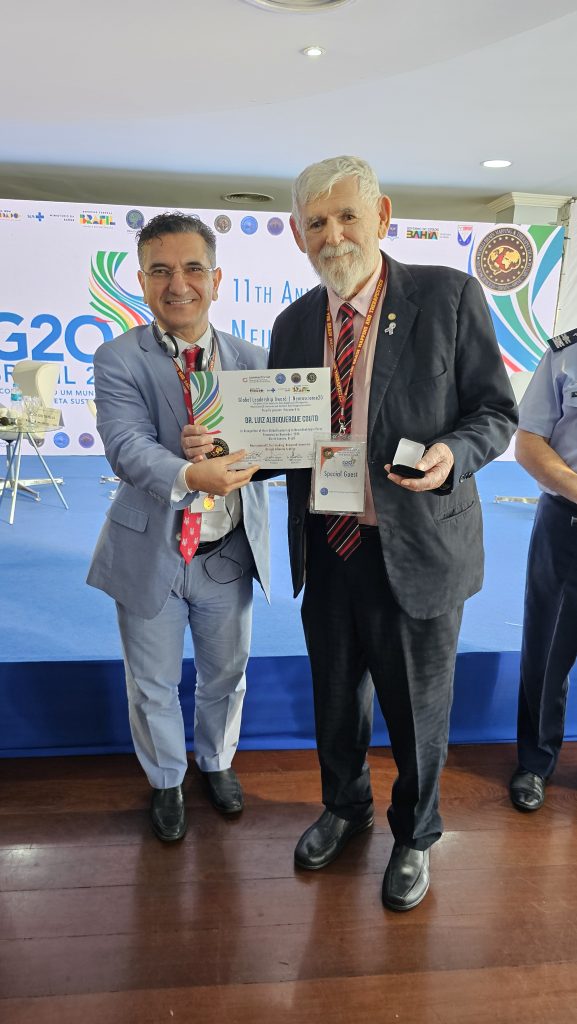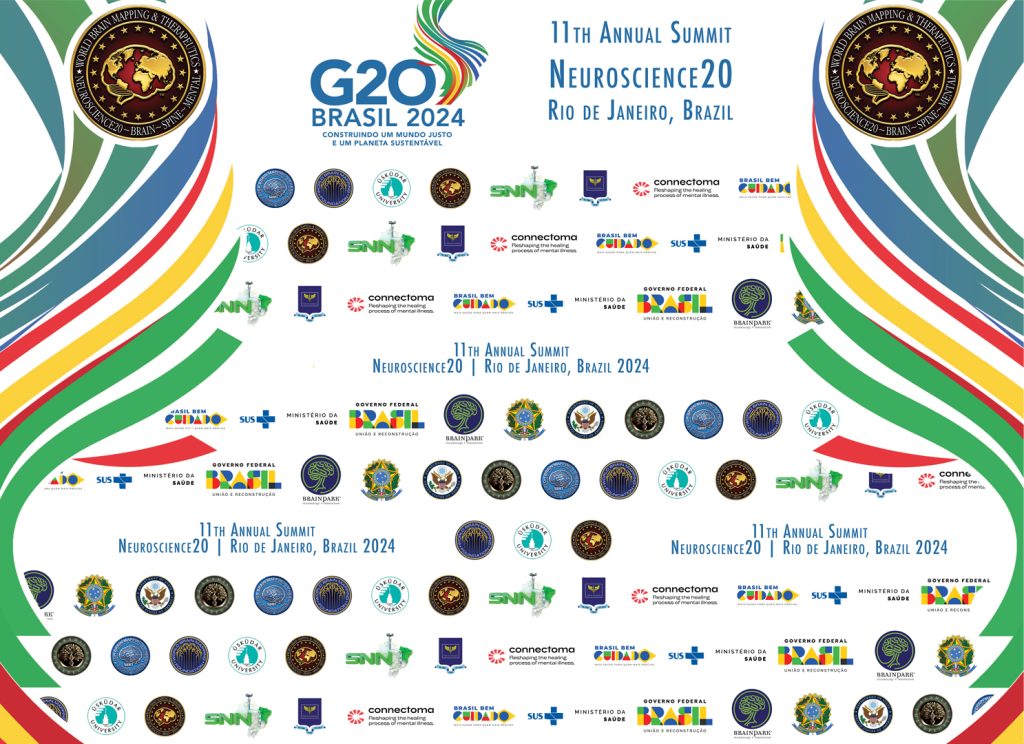Comissão dos Direitos da Pessoa Idosa Marca Presença no G20 e Reforça a Necessidade de Políticas Públicas para o Envelhecimento Ativo e Saudável

Comissão dos Direitos da Pessoa Idosa Marca Presença no G20 e Reforça a Necessidade de Políticas Públicas para o Envelhecimento Ativo e Saudável https://blogdoluizcouto.blogspot.com/2024/11/comissao-dos-direitos-da-pessoa-idosa.html?m=1 novembro 17, 2024 A Comissão de Defesa dos Direitos da Pessoa Idosa (CIDOSO), participou durante todos os dias da programação do G20 Social, no Rio de Janeiro e realizou um seminário sobre Transição Demográfica e Desafios para um Envelhecimento Ativo e Saudável, promovido no contexto da Cúpula do G20. O evento se mostrou de extrema importância para o debate sobre políticas públicas voltadas à população idosa, especialmente em relação às doenças neurodegenerativas, que afetam cada vez mais os idosos no Brasil e no mundo. Durante o seminário, que contou com a presença dos deputados membros da Comissão do Idoso da Câmara, Luiz Couto Alexandre Lindenmeyer, Pastor Gil, Osessio Silva, Flávia Moraes e Reimont, além de especialistas em neurociência, foi discutido o crescente desafio das doenças do cérebro e a necessidade de enfrentá-las com mais recursos e atenção, em particular no contexto do envelhecimento da população global. Ao final do seminário, a Comissão de Defesa dos Direitos da Pessoa Idosa entregou ao ministro Felipe Sherpa, representante do G20, um documento formalizando o compromisso de incluir a Transição Demográfica e o Envelhecimento Populacional como temas prioritários no relatório final da Cúpula do G20. A proposta busca garantir que a temática do envelhecimento ativo seja considerada na agenda internacional de saúde e bem-estar, com ênfase no desenvolvimento de políticas públicas adequadas para a população idosa. O deputado Luiz Couto, em sua fala de encerramento, destacou a importância da inclusão da questão do envelhecimento no debate global e a urgência de ações concretas para enfrentar os desafios impostos pela transição demográfica. “O envelhecimento da população é uma realidade crescente e, para que nossos idosos possam viver com qualidade de vida, é fundamental que se invista em políticas públicas de saúde, prevenção e educação. Precisamos dar um passo firme para garantir que a dignidade e os direitos dos idosos sejam respeitados em todas as esferas, tanto no Brasil quanto no mundo”, afirmou o deputado. “Com a participação efetiva dos deputados e a colaboração dos especialistas em neurociência, a Comissão de Defesa dos Direitos da Pessoa Idosa reafirma seu compromisso com a luta por um envelhecimento saudável e ativo, além de contribuir para a construção de políticas públicas que atendam às necessidades da população idosa no Brasil e no cenário mundial”, disse deputado Reimont, Presidente da CIDOSO.
Neuroscience20 working group come together at the Rio de Janeiro two days before G20 leaders’ Summit

Neuroscience20 working group come together at the Rio de Janeiro two days before G20 leaders’ Summit World leaders in mental health, cancer, and neurotech come together to discuss how to curb human and financial costs of neurological and neuro-psychiatric disorders to the world economy, which is more than $16T annually Los Angeles, California// in 2014 Society for Brain Mapping and Therapeutics (SBMT) launched the largest international partnership across brain, cancer, mental health and spine initiatives bringing together world leaders, scientists, clinicians, engineers, policymakers, industry leaders, government officials. NGOs/non-profits started to form a Neuroscience20(20) working group. N20 now include G20 countries plus new guest members every year and has been the force behind the global leader’s G20 Summit understanding and raising awareness about the cost of neurological disorders to the world economy of $16T. In addition, N20 has been working with the World Bank, WHO, the White House, the U.S. Congressional Precision Medicine and Congressional Neuroscience Caucus, Brazilian, Indian, Japanese, Mexican, Argentinian, Australian, Canadian, and E.U. members of parliaments to ensure the human and financial costs of neurological, mental, and spine disorders are addressed through a global neurotech innovation and policy including introductions of advanced therapeutics and diagnostics, which could save billions in costs. “This year at the N20, we have 9 members of Brazilian Parliament and officials from the ministry of Health and Technologies of Brazil; we are truly honored to work closely with the Brazilian Parliament, the US Congress and parliaments of G20 countries to address the alarm in raise in the human and financial cost of neurological, neuropsychiatric disorders and cancer”, said, Dr. Babak Kateb, Founding Chairman of the Board of SBMT, Chairman of N20 Global Working Group and President of World Brain Mapping Foundation According to the World Health Organization’s large-scale studies, about a third of the worldwide adult population suffer from mental disorders such as depression, anxiety and schizophrenia. If also taken together with neurological disorders, such as dementia and stroke, these “disorders of the brain” account for 13% of the global disease burden. This surpasses cardiovascular diseases (5%) and cancer (10%). Countries with the highest-burden rate> 650 Disability Adjusted Life Years per 100,000 population include the USA, China, India, U.K., Russia, and Australia. “It is critical that we establish brain screening the same way we screen other organs, such as breast and prostate, so we can detect neurological disorders earlier and better treatment at the earliest stage” said, Dr. Marcos Wagner, President of N20-Brazil and professor of neurosurgery. The annual cost of taking care of patients with neurological disorders in the U.S. alone approaches $1.5T, of which $200B is for Alzheimer patients, and for the world, the annual cost today is estimated at $16T. In China, 975,000+ people die annually from brain trauma alone, and the Alzheimer population in the Australasia corridor is rapidly rising. Thus, the European Union, China, India, Japan and Australia are not immune from such high cost of healthcare because of significant government insurance coverage. “At N20, we also focused on how better detect, prevent and cure cancer because by 2050, 35.3+ million cancer cases are expected, which is a 76.6% increase from the 2022 (20 million). Unfortunately, 18.5 million cancer deaths are projected by 2050, which is about 90%% increase from 2022 (9.7 million). The global and the G20 country population is growing and aging, which contributes to the rising number of cancer cases; therefore, we need to create a united front to battle this using AI, Quantum/supercomputing and nanotechnology.” said, Dr. Vicky Yamamoto, Executive Director, 20th President of SBMT and Cance Scientist at Keck School of Medicine of USC and USC Norris Comprehensive Cancer Canter. N20 program brings finest world leaders and scientists together. This year Honorable (Hon.) Federal Deputy Pedro Doshikazu Pianchao Aihara, President of Committee for the Defense of Rights of Elderly in the Chamber of Deputies will be discussing Brazil policy on aging followed by and panel discussion by Brazilian members of parliament Hon. Luiz Albuquerque Couto, Hon. Gildenemir de Lima Sousa, Hon. Zacharias Cali Hamu, Ho. Flavia Carrerio Albuqurerque Morais, Hon. Ossesio Jose da Silva, Hon. Reimont Luiz Otoni Santa Barbara, Hon. Geraldo Resende Pereira and the Hon. United States Congressman Eric Swalwell and Dr. Manuel Hernandez Salazar (Mexican Delegation). “We are truly honored to have such a remarkable summit and luminary scientists and policymakers in Brazil and exited to remail engaged in this effort of saving millions of live through applying advance neurotechnology and policies” said Lt. Colonel Dr. Jorge Luiz Amorim Correa, Member of the N20 Brazil program committee. Keynotes including Hon Daniel Almeida Filho, Federal Secretary of Technology Development and Innovation of the Ministry of Technology and Innovation; Dr. Babak Kateb, Chairman of N20 who will be speaking on the role of AI and immerging neuro-technologies on global healthcare, Dr. Giulio Maria Pasinetti, Director of the Center on Molecular Integrative Neuro-resilience at Mount Sinai School of Medicine covering The State-of-the-science and Technology for the diagnosis and treatment of Alzheimer’s and Dementia. Dr. Sheila Martins, professor of Neurology at Federal University of Rio will be addressing the Global Policy on Stroke Prevention and Treatment. Drs. Daniel Diez and Jaime Addan (European delegation from Spain-Connectoma Corporation) , will present their pioneering software for repetitive Transcranial Magnetic Stimulation (rTMS), which will have the FDA approval by the end of the year. The program will cover the role of the neurotech in cancer, neuro-degenerative disorders, neuro-psychiatric disorders, neurotrauma, spinal disorders, epilepsy, and recommend the brain screening as the key global action item to detect and treat neurological disorders earlier, reducing the cost of the healthcare and increase healthcare efficiency. This program is made possible by generous contributions of Aramis Therapeutics, World Brain Mapping Foundation, Brain Technology and Innovation Park (BTIP), Society for Brain Mapping and Therapeutics (SBMT), Connectoma Corporation, and Uskudar University in partnership with Brazilian Airforce, DIRSA, Club Aeronatica, Minister of Technology and Innovation of Brazil, and the Parliament of Brazil, World Stroke Organization, Rede Brasil AVC, NASP, MUSAL, Pharmacia Saude, Angels Initiative, ALLM, Hospital Moinhos de Vento, Lavimpi and Hanger 7 Eventos. For more information about the program please visit our website at: Neuroscience20 Brazil 2024 – Society for Brain Mapping and Therapeutics For more information about SBMT and N20 please visit
